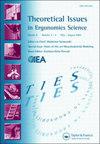Does standing alter reaction times and event related potentials compared to sitting in young adults? A counterbalanced, crossover trial
IF 1.4
Q4 ERGONOMICS
引用次数: 1
Abstract
Abstract The present study investigated the effects of attending lectures in sitting and standing postures on executive function of young adults. In this randomized, counterbalanced, crossover trial on 15 adults (19.2 ± 2.4 years), selective attention and executive control (response inhibition) were measured through reaction times and event related potentials (ERPs using electroencephalography [EEG]) associated with congruent and incongruent stimuli presented during a modified Eriksen flanker task. The reaction times and latencies of ERPs for the modified Eriksen flanker task among the interventions (sitting/standing), conditions (congruent/incongruent) and EEG electrodes were analyzed using analyses of variance. Attending a lecture in a standing posture was found to improve executive function (response inhibition) measured with reaction times (for incongruent stimuli) and ERPs (P3 [cognitive potential] amplitude at Pz and Cz electrodes; irrespective of congruent/incongruent stimuli) compared to that of the sitting posture. Standing might improve executive function compared to sitting among young adults in a simulated lecture environment.与坐着相比,站立会改变年轻人的反应时间和事件相关电位吗?一个平衡的交叉试验
摘要本研究调查了以坐姿和站姿参加讲座对年轻人执行功能的影响。在这项针对15名成年人(19.2 ± 2.4 年),选择性注意力和执行控制(反应抑制)是通过反应时间和事件相关电位(使用脑电图[EG]的ERPs)来测量的,这些电位与在修改的Eriksen侧卫任务中呈现的一致和不一致刺激有关。使用方差分析分析了干预措施(坐/站)、条件(一致/不一致)和EEG电极中改良Eriksen侧卫任务的ERPs的反应时间和潜伏期。研究发现,与坐姿相比,以站姿参加讲座可以改善执行功能(反应抑制),通过反应时间(针对不协调刺激)和ERP(Pz和Cz电极的P3[认知电位]振幅;无论一致/不协调刺激如何)来测量。与坐在模拟演讲环境中的年轻人相比,站着可能会提高执行功能。
本文章由计算机程序翻译,如有差异,请以英文原文为准。
求助全文
约1分钟内获得全文
求助全文

 求助内容:
求助内容: 应助结果提醒方式:
应助结果提醒方式:


